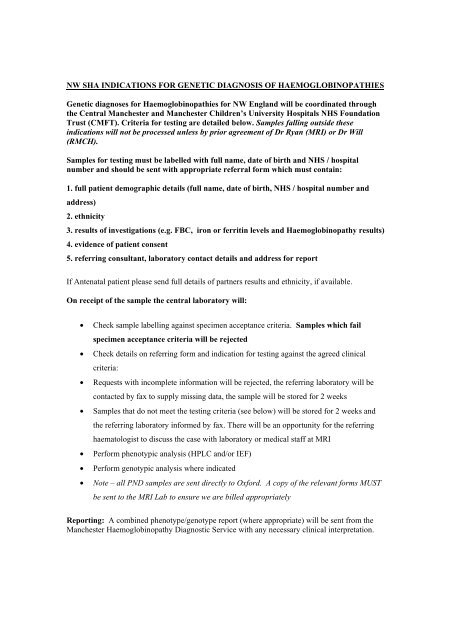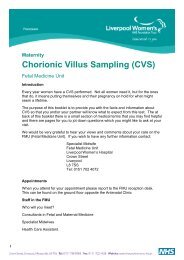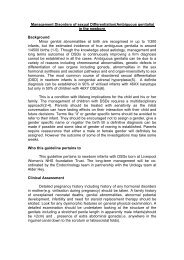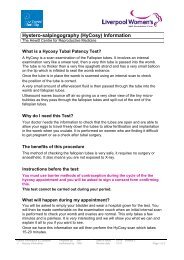Hbopathy Diagnostic algorithm - Liverpool Womens NHS ...
Hbopathy Diagnostic algorithm - Liverpool Womens NHS ...
Hbopathy Diagnostic algorithm - Liverpool Womens NHS ...
You also want an ePaper? Increase the reach of your titles
YUMPU automatically turns print PDFs into web optimized ePapers that Google loves.
NW SHA INDICATIONS FOR GENETIC DIAGNOSIS OF HAEMOGLOBINOPATHIESGenetic diagnoses for Haemoglobinopathies for NW England will be coordinated throughthe Central Manchester and Manchester Children’s University Hospitals <strong>NHS</strong> FoundationTrust (CMFT). Criteria for testing are detailed below. Samples falling outside theseindications will not be processed unless by prior agreement of Dr Ryan (MRI) or Dr Will(RMCH).Samples for testing must be labelled with full name, date of birth and <strong>NHS</strong> / hospitalnumber and should be sent with appropriate referral form which must contain:1. full patient demographic details (full name, date of birth, <strong>NHS</strong> / hospital number andaddress)2. ethnicity3. results of investigations (e.g. FBC, iron or ferritin levels and Haemoglobinopathy results)4. evidence of patient consent5. referring consultant, laboratory contact details and address for reportIf Antenatal patient please send full details of partners results and ethnicity, if available.On receipt of the sample the central laboratory will:• Check sample labelling against specimen acceptance criteria. Samples which failspecimen acceptance criteria will be rejected• Check details on referring form and indication for testing against the agreed clinicalcriteria:• Requests with incomplete information will be rejected, the referring laboratory will becontacted by fax to supply missing data, the sample will be stored for 2 weeks• Samples that do not meet the testing criteria (see below) will be stored for 2 weeks andthe referring laboratory informed by fax. There will be an opportunity for the referringhaematologist to discuss the case with laboratory or medical staff at MRI• Perform phenotypic analysis (HPLC and/or IEF)• Perform genotypic analysis where indicated• Note – all PND samples are sent directly to Oxford. A copy of the relevant forms MUSTbe sent to the MRI Lab to ensure we are billed appropriatelyReporting: A combined phenotype/genotype report (where appropriate) will be sent from theManchester Haemoglobinopathy <strong>Diagnostic</strong> Service with any necessary clinical interpretation.
INDICATIONS FOR MOLECULAR TESTING1. Antenatal or pre-conceptual counsellinga) National Screening Committee guidance:Maternal carrier state Paternal carrier state Further studies by DNA analysisNo abnormalities detectedPartner testing notrequiredNone requiredAny abnormal Hb No abnormality detected None requiredHb S Hb S or Hb C None required until PNDHb SHb O-Arab, D-Punjab,Lepore, β thalassaemiaSend bloods for mutation confirmationof paternal carrierHb S HPFH Send bloods for mutation confirmationof paternal carrier state; if confirmed,PND is not indicatedHb C Hb S None required until PNDHb D-Punjab Hb S Send bloods for mutation confirmationfor suspected D-PunjabHb O-Arab Hb S Send bloods for mutation confirmationof Hb O-ArabHb LeporeHb E*Hb S, E, O-Arab, Lepore,β thalassaemiaβ thalassaemia, HbLepore,Send bloods for mutation confirmationof Hb Lepore or Hb O-ArabSend bloods for mutation confirmationof β thalassaemia, Hb Leporeβ thalassaemiaβ thalassaemia*suspected α + thalassaemia(MCH of 25–27pg)Suspected heterozygous α0or homozygous α+thalassaemia (MCH < 25pg)1. Indian, Pakistani, Africanor North European, MiddleEastern2. South-East Asian, EasternMediterranean (Cyprus,Greece, Turkey, Sardinia),British** or unknownHb S, E, O-Arab, Lepore,β thalassaemiaSuspected α thalassaemia(MCH
* = hidden risk of α thalassaemia ** = The NSC guidelines indicate that the partner need notbe tested unless the patient is from a local high risk area (e.g. North-West England).Abbreviation: PND, prenatal diagnosis2. Carrier identification for genetic counselling purposes in non antenatal patients ofappropriate age group.• Diagnosis of unidentified Haemoglobin variants in pregnant women and/or partners (to link tovariants identified in newborn screening programme)3. Prenatal diagnosisPrenatal diagnosis will be offered to couples at risk of having a child with any of the conditionsthat are listed belowHb SS, Hb SC, Hb SD Punjab Hb S/β thalassaemia (β o , β + , δβ thal, Lepore) Hb S OArab Hb E/βthalassaemia Hb Bart’s hydrops fetalis (α o /α o ) β thalassaemia major (except cases with silent ornear silent maternal phenotype)Parental samples, needed prior to PND procedure, will be arranged by the specialist nurses at theMSCTC.4. Newborn, Paediatric for genetic counselling and clinical management• Genotypic investigation of B thalassaemia major/intermedia phenotype• Investigation of Hb H disease (+ parents)Confirmation of Hb variant/ B thalassaemia, if not apparent from parental phenotypes.• Unknown Hb variant analysis• Sickle /HPFH5. Adult haemoglobinopathy patients for genetic counselling and clinical management• Genotypic investigation of B thalassaemia intermedia phenotype• Investigation of abnormally raised Hb F levels (>5%)• Confirmation of Hb variant/ thalassaemia if not apparent from phenotype6. Investigation of possible alpha thalassaemia phenotype where clinically relevant (i.e.obviates need for further investigations)These cases are extremely heterogeneous with many potential genetic defects. Testing isprimarily indicated where it will impact on clinical management or where it is deemed importantfor genetic counselling. Family studies in such cases may be informative ie in compoundheterozygous states and should be performed initially, if feasible.• Thalassaemia intermedia phenotype (severe microcytic anaemia Hb > 2g/dl below normalrange plus clinical features of haemolysis/splenomegaly, bone features, gallstones etc).• Hb H disease• Investigation of possible underlying alpha thalassaemia contributing to Anaemia ofChronic Disease when apparently iron replete
7 Investigation of unstable or high affinity haemoglobinNB this list is not exhaustive. If in doubt about a referral please contact:Dr Kate Ryan Tel: 0161 276 6772 or email: kate.ryan@cmft.nhs.ukDr Andrew Will Tel: or email: andrew.will@cmft.nhs.ukThis document available at www.tinyurl.com/haemoglobinopathyreferrals





